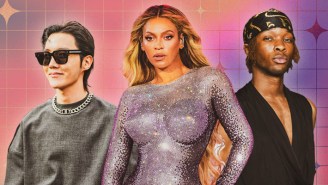Prince was born to be on camera even if he was never cut out to be a movie star. Like Madonna, he made great use of MTV in the channel’s early days, when those destined to thrive in the 1980s learned how to join their songs to arresting images. And Prince was never less than an arresting image, sporting an early-’80s wardrobe that seemed inspired in equal parts by prom dresses, sci-fi uniforms, and 18th-century dandies. When he performed, he alternated between playing directly to the camera and ignoring it. Either way, the camera loved him. The 1987 film Sign O’ The Times rarely comes up on any list of great concert films, but give it another look and you’ll find yourself wondering why.
When he wasn’t performing… that was another story. Prince gave interviews infrequently and never seemed particularly relaxed when he did. Acting was even more of a challenge. With a mic in his hand, no one was more charismatic. Tasked with playing a dramatic scene, or any emotion beyond aroused amusement, and he struggled. Prince appeared in three narrative films, essentially giving up on acting after the poorly received Graffiti Bridge in 1990, which arrived on the heels of the even less kindly received 1986 film Under the Cherry Moon, which Prince also directed.
But in 1984, Prince made movies work for him with Purple Rain, the story of The Kid, an extremely Prince-like musician trying to make it in Minneapolis fronting a band called The Revolution. The film falls somewhere between an act of semi-autobiography and self-mythology, even if it stops well short of hagiography. Depicted as egotistical and damaged, The Kid is a not-always-likable figure. He ignores band members Wendy and Lisa (Wendy Melvoin and Lisa Coleman, members of the real-life Revolution just like the other members of the onscreen band) and in a pair of scenes, following the example of his abusive father (Clarence Williams III), abuses his girlfriend Apollonia (Apollonia Kotero).
The film is co-written by TV veteran William Blinn and Albert Magnoli, the latter of whom served as Prince’s manager at one point. Magnoli also directs, but it’s Prince’s movie in every conceivable sense. The Kid learns to collaborate by opening his mind and accepting Wendy and Lisa’s song, which turns out to be the film’s title track, “Purple Rain.” And he triumphs by overcoming his scheming, obnoxious rivals in The Time, whose funky performances legitimately seem like they could challenge Prince. But the fix was in on any competition: In real life, The Time was a Prince creation, playing songs co-written by Prince. Purple Rain was Prince’s world and everyone in it had a part to play.
In 1984 that world extended well beyond the confines of the film. It’s hard to understate how unavoidable Prince was at the time. After years of minor hits and critical acclaim, he’d had a commercial breakthrough two years earlier with the album 1999, which yielded mammoth hits and turned him into an MTV fixture. The film was part of a full-court press to keep that success going, preceded a month earlier by the soundtrack album and two months earlier by the hit single “When Doves Cry.” Turn on the radio and Prince was there. Turn on the TV and Prince was there. Go to the movies and Prince was there, too.
It was calculated, sure, an attempt to sell a product across several media at once. But consider what was being sold: A weird genius making music like nobody else. Have there been any stranger major hits than “When Doves Cry,” a stripped-down, bass-free, agonized cry from the heart wrapped around a peculiar, seemingly deeply personal metaphor? For all the autobiographical elements, the Purple Rain soundtrack feels far more ripped from Prince’s life than the movie, continuing and intensifying his obsessions with God and sex and the way music can express feelings about both that no other form of art can.
Without that music, there would be no reason for Purple Rain to exist. Really, it’s odd that it exists at all. Prince was an intensely private person who is, in some ways, best known for the weird stories that have circulated about him, and in retrospect it now seems odd that he would attempt to tell any version of his story, even one as stretched and strained to fit into Hollywood formula as Purple Rain. At the same time, Prince was also canny, possibly recognizing that he was approaching the apex of his public acceptance, if not his artistic powers. If he was going to tell his story, this was the time.
Purple Rain might be Prince’s best album. Or it might not be. There are at least a half-dozen albums for which that claim could be made. But it’s the pinnacle of Prince-ness. And if the movie doesn’t capture the fullness of Prince’s genius at the time, it still preserves forever the look of the moment; the Minneapolis from which Prince emerged; the club, First Avenue, that helped make him a star; the synergistic power of The Revolution moving in time behind him; and the crowd doing its best to emulate the androgynous glamour of the star who brought them there.
Then there’s the music: Prince never nails his dramatic scenes, but he’s vulnerable and open on stage in ways he seemingly couldn’t be elsewhere, playing the title track in the film’s climactic moment as if everything depended on him expressing its emotions to the crowd. And, in a sense, it did. For all the oddness of his art — starting with the highly personal symbolism that informed the lyrics of his classic albums — Prince had a remarkable way of connecting with his audience. Be they at a concert or alone, hiding behind headphones, he could draw them into his world of funk and yearning and spirituality. He was never a movie star. He was bigger than that. But for two hours, Purple Rain gives a hint of why he mattered so much to so many — and why he’ll go on mattering even now that he’s gone.
Purple Rain is available for streaming via Amazon Video and iTunes.






